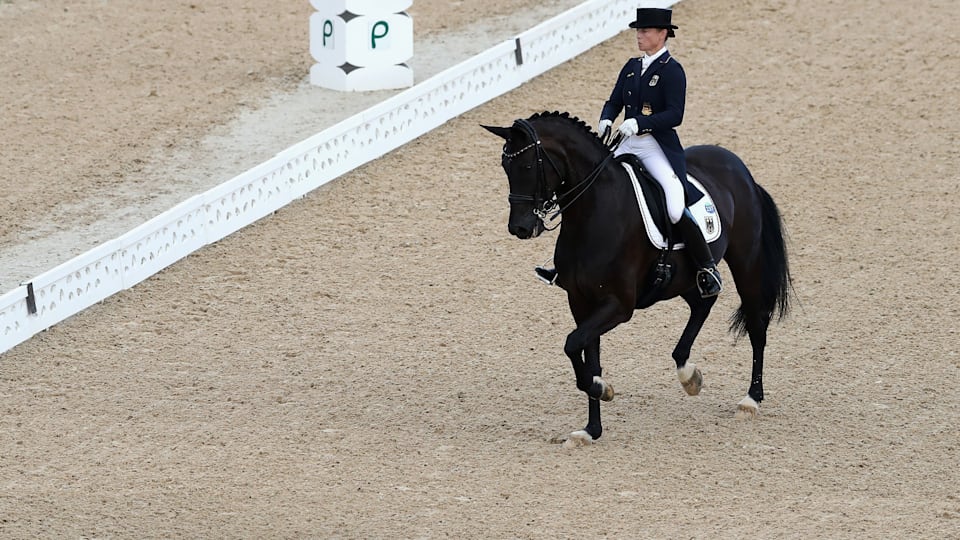Dressage legend Isabell Werth and her horses
For Isabell Werth, the most decorated Olympic equestrian athlete of all time, it is simple: the horse is everything. “Without a top horse you have nothing, you are just a rider, nothing more,” said the German who has won six gold and four silver medals in dressage during a career which has, to date, spanned five Olympic Games.

“I always say it is 60 per cent the horse and 40 per cent the rider,” Werth explained. “Maybe at the end, when you are fighting for an Olympic gold, then you have 5 per cent more down to the rider, to know how to manage the pressure and expectation. But without a horse you are nothing.”
Werth is no doubt almost as modest as she is successful. The 49-year-old started her Olympic career at the Barcelona 1992 Games with the chestnut gelding Gigolo. The pair went on to form the sport’s most successful partnership in history, winning three Olympic team titles (1992, 1996 and 2000), individual gold in Atlanta in 1996 and individual silver at both Barcelona 1992 and Sydney 2000, as well as four World Championship titles and five European crowns.
If that was not enough, Werth then paired up with Satchmo to win team gold and individual silver at Beijing 2008, before repeating the trick at Rio 2016 with new mount Weihegold.
“It is a long way to go as partners,” Werth laughed. “Normally the way is that you find a horse aged three or four or five and then you need about five years before you start competing internationally, and then hopefully you make the dream come true and you qualify for the Olympics.
“It is a daily process. You get a feeling that the horse could be something special, that the horse could become a champion, and then you start step by step. It is a question of time. You grow together like you do with a child. It’s like going from the first school to the upper school and then to university.
It is the reason why our sport is timeless and ageless, you always have this partnership, this relationship. You never get tired of trying to get better
“You learn to work together, you learn weak points, strong points. You learn how to deal with different situations, with rain, with sun, with a special atmosphere, when there isn’t a good atmosphere. And things hopefully come together competition by competition, year by year.”
The dedication required is absolute. Werth happily admits that the bond she creates with her horses – whether it is Gigolo, Satchmo, Weihegold or Bella Rose, the mount on which she claimed double gold at last year’s World Equestrian Games – is always the priority. “The relationships are very close and very emotional,” said Werth, who revealed that she travels with her horses in the cargo bays on aeroplanes “whenever it is possible” because it makes her “feel much better”.
“A lot of partnerships between horses and riders last longer than a marriage; that is a reality. The feelings and emotions you have with each horse are the fundamentals. From that point you can start. You need the special bond, the special partnership for special success.”
It is not always easy. While Werth felt utterly “honoured” to find Gigolo – “an outstanding, exceptional athlete, always motivated” – her next ride, Satchmo, presented an entirely different puzzle to solve.
“On the one hand Satchmo was so dominant, and on the other he was scared,” Werth said. “For more than one-and-a-half years we had big, big problems. It was like sitting in a Ferrari but you couldn’t drive it.
“I knew I had an exceptional horse but I couldn’t find the solution. I couldn’t find the key. I had a lot of sleepless nights thinking about what to do and then finally we found the solution together, and we won two Olympic medals.
“With each horse you learn so much.”
When pushed, Werth, who always wants to propel her incredible partners to the forefront, reluctantly admits that her expertise does play a role.
“Yes, with Weihegold I could manage the situations at the Olympics better than with Gigolo because I had learnt so much,” she said with a shrug. “I had so much experience and knew what to do in the special atmosphere that is the Olympics.”
After missing the London 2012 Games due to her primary horse being injured and her back-up not ready, Werth and Weihegold won Germany yet more medals at Rio 2016. And for the rider, the third Olympic gold medal-winning partnership delivered just as much joy as the first.
“Weihegold is like a ‘competition machine’. At home, between the competitions we take a rest, we train a bit and she is so cool and relaxed and nothing can touch her, but then when she feels we are getting closer to the competition, when I start working on more detail, straight away she is on it,” Werth marvelled.
“It is the reason why our sport is timeless and ageless, you always have this partnership, this relationship. You never get tired of trying to get better.”
All of this does, however, make it tough when these partnerships come to an end. Werth spent more than 20 years working with both Gigolo and Satchmo. She still sees the latter on a daily basis, as he enjoys a well-deserved retirement at Werth’s home in Rheinberg. But despite the pain of separation, Werth’s main emotion remains one of unbridled excitement that she still gets to do what she loves.
“My big dream is to take Bella Rose to Tokyo [for the Olympic Games 2020]. She was my big dream for Rio, but she got injured,” Werth said, the enthusiasm clear in her voice. “I hope she will stay fit and healthy like she is now. Although I have the lucky situation to have the other option of the great Weihegold.”